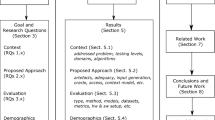Abstract
One of the difficulties in goal-oriented requirements engineering (GORE) is the construction of behaviour models from declarative goal specifications. This paper addresses this problem using a combination of model checking and machine learning. First, a goal model is transformed into a (potentially Zeno) behaviour model. Then, via an iterative process, Zeno traces are identified by model checking the behaviour model against a time progress property, and inductive logic programming (ILP) is used to learn operational requirements (pre-conditions) that eliminate these traces. The process terminates giving a non-Zeno behaviour model produced from the learned pre-conditions and the given goal model.
Similar content being viewed by others
References
Anton AI (1997) Goal identification and refinement in the specification of software-based information systems. PhD thesis, Atlanta, GA, USA
Alrajeh D, Russo A, Uchitel S (2008) Deriving non-zeno behavior models from goal models using ilp. In: Proceedings of the ETAPS/FASE08 conference on foundation aspects of software engineering
Courtois PJ, Parnas DL (1993) Documentation for safety critical software. In: Proceedings of the 15th ICSE conference, pp 315–323
Damas C, Dupont P, Lambeau B, van Lamsweerde A (2005) Generating annotated behavior models from end-user scenarios. IEEE Trans on Softw Eng 31(12): 1056–1073
Damas C, Lambeau B, van Lamsweerde A (2006) Scenarios, goals, and state machines: a win–win partnership for model synthesis. In: Proceedings of the interntional ACM symposium on the foundations of software engineering
Darimont R, van Lamsweerde A (1996) Formal refinement patterns for goal-driven requirements elaboration. In: Proceedings of the 4th ACM symposium on the foundations of software engineering
Dardenne A, van Lamsweerde A, Fickas S (1993) Goal-directed requirements acquisition. Sci Comput Program 20(1): 3–50
Giannakopoulou D, Magee J (2003) Fluent model checking for event-based systems. In: Proceedings of the 11th ACM SIGSOFT symposium on foundations software engineering
Giorgini P, Mylopoulos J, Sebastiani R (2005) Goal-oriented requirements analysis and reasoning in the tropos methodology. Eng Appl Artif Intell 18: 159–171
Heitmeyer C, Bull A, Gasarch C, Labaw B (1995) Scr*: a toolset for specifying and analyzing requirements. In: Proceedings of the 10th annual conference on computer assurance
Kramer J, Magee J, Sloman M (1983) Conic: an integrated approach to distributed computer control systems. In: IEE Proceedings of the part E 130
Letier E (2002) Goal-oriented elaboration of requirements for a safety injection control system. Technical report, Dèpartement d’Ingènierie Informatique, UCL
Letier E, Kramer J, Magee J, Uchitel S (2005) Fluent temporal logic for discrete-time in event-based models. In: Proceedings of the 10th European software engineering conference
Letier E, Kramer J, Magee J, Uchitel S (2006) Deriving event-based transitions systems from goal-oriented requirements models. Technical Report 02/2006, Imperial College, London
Letier E, Van Lamsweerde A (2002) Deriving operational software specifications from system goals. In: Proceedings of the 10th ACM SIGSOFT symposium on foundations of software engineering
Letier E, van Lamsweerde A (2002) Agent-based tactics for goal-oriented requirements elaboration. In: Proceedings of the 24th intlernational conference on software engineering
Van Lamsweerde A, Willemet L (1998) Inferring declarative requirements specifications from operational scenarios. IEEE Trans Softw Eng 24(12): 1089–1114
Magee J, Kramer J (1999) Concurrency: state models and java programs. Wiley, New York
Manna Z, Pnueli A (1992) The temporal logic of reactive and concurrent systems. Springer, New York
Miller R, Shanahan M (2002) Some alternative formulation of event calculus. Computer science; computational logic; logic programming and beyond, 2408
Muggleton SH (1995) Inverse entailment and progol: new generation computing, special issue on inductive logic programming 13(3/4): 245–286
Ray O (2009) Nonmonotonic abductive inductive learning. J Appl Logic 7(3): 329–340
Ray O, Broda K, Russo A (2004) A hybrid abductive inductive proof procedure. Logic J IGPL 12(5): 371–397
Shanahan MP (1997) Solving the frame problem. MIT Press, Cambridge
Sutcliffe A, Maiden NAM, Minocha S, Manuel D (1998) Supporting scenario-based requirements engineering. IEEE Trans Softw Eng 24: 1072–1088
Uchitel S, Brunet G, Chechik M (2007) Behaviour model synthesis from properties and scenarios. In: Proceedings of the 29th IEEE/ACM international conference on software engineering
Author information
Authors and Affiliations
Corresponding author
Additional information
Communicated by J.L. Fiadeiro, P. Inverardi and T.S.E. Maibaum
Rights and permissions
About this article
Cite this article
Alrajeh, D., Kramer, J., Russo, A. et al. Deriving non-Zeno behaviour models from goal models using ILP. Form Asp Comp 22, 217–241 (2010). https://doi.org/10.1007/s00165-009-0128-5
Received:
Accepted:
Published:
Issue Date:
DOI: https://doi.org/10.1007/s00165-009-0128-5




